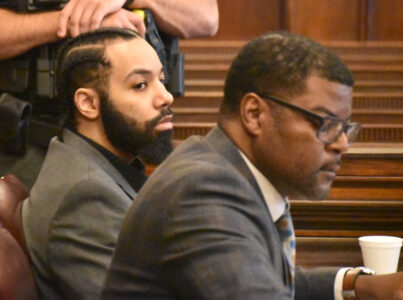Judge denies new trial for man convicted in ’22 murder

YOUNGSTOWN — Mahoning County Common Pleas Court Judge Anthony D’Apolito on Monday ruled against a motion for a new trial sought by attorneys for Akeem Hargrove, 32, who was sentenced in September to life in prison without the possibility of parole in the Dec. 22, 2022, shooting death of Devin Bell, 26, outside the Shell gas station on South Avenue.
D’Apolito ruled from the bench at the end of a hearing that included Hargrove’s attorneys, Stanley Booker and Melanie Womer, and Special Prosecutor Brad Gessner, who was among the attorneys who prosecuted the case on appointment from the Ohio Supreme Court.
The motion argues that Hargrove should get a new trial as a result of alleged misconduct by one or more jurors in Hargrove’s trial and other issues.
At Monday’s hearing, Booker focused mostly on the actions of a juror who Booker said “conducted independent research on his cellphone related to GPS coordinates of the defendant” and that the juror also shared the information with the other jurors.
The motion contained an affidavit from a juror who alleged that “while deliberating,” another of the jurors “began researching how cellphone towers worked, how they pinged from certain areas and how the messages would be received.”
The affidavit states that the juror doing the research “began telling the other jurors that the defendant was in the area of the murder based on his research.” It added that the juror was “actually reading off the information to the jurors and we all discussed his findings.”
The juror who reported the fellow juror’s actions said he or she “was the only juror that was voting not guilty.” The juror who reported the fellow juror’s actions said he or she “wrote a note to the (court officials) and asked to speak.”
He or she stated that D’Apolito “brought me to the courtroom and asked me questions.”
During Monday’s hearing, D’Apolito narrowed the focus of what he considered the relevant issue in the motion — alleged juror misconduct. He said that allegation needed to be brought to the court’s attention by the defense within 14 days of the verdict being rendered unless the defense was unavoidably prevented from filing the motion for new trial.
Gessner said that the defense motion contains “all kinds of speculation over what a juror may have done in the jury room without any proof.”
He added, “It’s a jump to get to how this materially affected this gentleman’s right to a fair trial when we don’t know any of that. And they have the burden to show that in order to prevail on this motion.”
Booker responded, “In this case, the Court subpoenaed all 12 jurors and questioned them all, and then he made a determination. So you can’t argue that we haven’t proven that my client was prejudiced (by the jurors’ actions).”
Then D’Apolito announced his decision, saying it is clear that the defense filed its motion for a new trial “more than 14 days after the verdict was read. The defense argues that is because of newly discovered evidence. I disagree. I think the basis of the motion was because of juror misconduct.”
D’Apolito said nothing that was found after the verdict “that had anything to do with the evidence presented during trial that could have (vindicated) the defendant that had any relevance because there wasn’t.”
D’Apolito said there was an allegation by one juror against another juror, saying that “cannot be presented unless there is some (outside) source that properly opens the door.”

